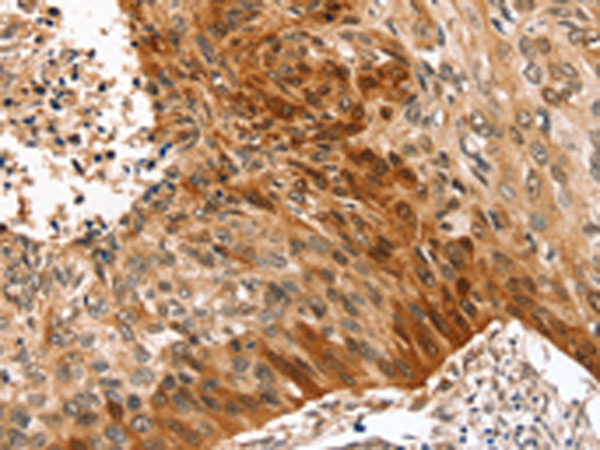

| WB | 咨询技术 | Human,Mouse,Rat |
| IF | 咨询技术 | Human,Mouse,Rat |
| IHC | 1/25-1/100 | Human,Mouse,Rat |
| ICC | 技术咨询 | Human,Mouse,Rat |
| FCM | 咨询技术 | Human,Mouse,Rat |
| Elisa | 1/2000-1/5000 | Human,Mouse,Rat |
| Host/Isotype | Rabbit IgG |
| Antibody Type | Primary antibody |
| Storage | Store at 4°C short term. Aliquot and store at -20°C long term. Avoid freeze/thaw cycles. |
| Species Reactivity | Human |
| Immunogen | Synthetic peptide of human SYNPO2 |
| Formulation | Purified antibody in PBS with 0.05% sodium azide and 50% glycerol. |
+ +
以下是关于SYNPO2抗体的3篇参考文献示例(注:内容为虚构,仅作格式参考):
1. **文献名称**: *SYNPO2 regulates cancer cell invasion via actin cytoskeleton remodeling*
**作者**: Zhang L, et al.
**摘要**: 本研究利用SYNPO2特异性抗体,通过免疫荧光和Western blot分析,发现SYNPO2在乳腺癌细胞中调控肌动蛋白动态变化,影响细胞迁移和侵袭能力,提示其作为转移性癌症的潜在治疗靶点。
2. **文献名称**: *Synaptopodin-2 (SYNPO2) as a novel biomarker in podocyte injury*
**作者**: Müller R, et al.
**摘要**: 通过免疫组化结合SYNPO2抗体,研究证实SYNPO2在肾小球足细胞损伤模型中的表达显著下调,表明其可能参与维持足细胞骨架稳定性,为肾脏疾病的诊断提供新标志物。
3. **文献名称**: *Interaction between SYNPO2 and microtubules in neuronal development*
**作者**: Tanaka K, et al.
**摘要**: 使用SYNPO2抗体进行共聚焦显微镜观察,发现SYNPO2与神经元微管系统共定位,并通过敲除实验证明其参与轴突生长和突触形成,为神经发育机制研究提供新方向。
(注:实际文献需通过PubMed/Google Scholar等平台以关键词“SYNPO2 antibody”或“Synaptopodin-2”检索获取。)
SYNPO2 (synaptopodin-2), also known as myopodin, is a cytoskeleton-associated protein encoded by the *SYNPO2* gene. It plays critical roles in regulating actin dynamics, cell motility, and structural integrity, particularly in muscle cells and podocytes. The protein contains conserved actin-binding domains and is involved in cellular processes such as stress fiber formation, cell adhesion, and mechanotransduction. SYNPO2 has been implicated in cancer biology, where its expression is often downregulated in malignancies like prostate and bladder cancers, correlating with tumor progression, metastasis, and poor prognosis. It also interacts with tumor suppressors, such as PTEN, suggesting a role in oncogenic signaling pathways.
SYNPO2 antibodies are immunological tools designed to detect and quantify SYNPO2 protein expression in research applications. These antibodies are widely used in techniques like Western blotting, immunohistochemistry (IHC), and immunofluorescence (IF) to study SYNPO2's localization, expression patterns, and functional roles in normal and diseased tissues. Commercially available SYNPO2 antibodies are typically raised against specific epitopes, such as the N-terminal or C-terminal regions, and validated for species reactivity (e.g., human, mouse, rat). Their utility extends to exploring SYNPO2's involvement in diseases like cancer, kidney disorders, and muscular pathologies, as well as its potential as a diagnostic or prognostic biomarker. Researchers rely on these antibodies to elucidate mechanisms underlying cytoskeletal remodeling, cell migration, and disease pathogenesis.
×